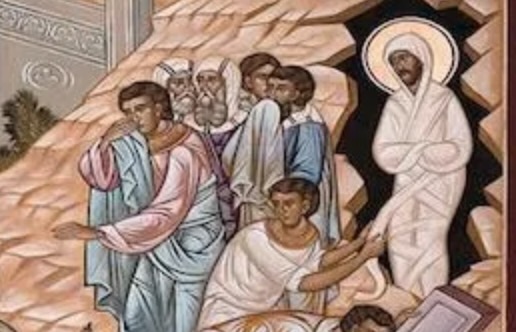Unbind Him and Let Him Go
March 27, 2023
When he [Jesus] had said these things, he cried out with a loud voice, “Lazarus, come out.” The man who had died came out, his hands and feet bound with linen strips, and his face wrapped with a cloth. Jesus said to them, “Unbind him, and let him go.” (John 11:43-44 ESV) Death is the great leveler. Rich or poor, loved or forgotten – all of us face death. But when Jesus calls the dead to come out, our ancient foe is defeated. Today at International Lutheran Church, we continue our study of Luther’s Small Catechism and look at the meaning of Confession and Absolution as we see in John 11 how the word and command of Jesus unbinds Lazarus.
Lent is a special season of contrition and repentance. This is visualized for us in the color of purple – the mixture of blue and red. For forty days we consider our Savior’s passion. His death and crucifixion were no accident but the result of God’s plan to remove our sin. In the Small Catechism. Luther takes up Confession as an ancient practice and expounds on the part that was and sometimes continues to be left out when we think about confession – the centrality of absolution!
What is Confession? Confession has two parts. First, that we confess our sins, and second, that we receive absolution, that is, forgiveness, from the pastor as from God Himself, not doubting, but firmly believing that by it our sins are forgiven before God in heaven.
What sins should we confess? Before God we should plead guilty of all sins, even those we are not aware of, as we do in the Lord’s Prayer; but before the pastor we should confess only those sins which we know and feel in our hearts.
Which are these? Consider your place in life according to the Ten Commandments: Are you a father, mother, son, daughter, husband, wife, or worker? Have you been disobedient, unfaithful, or lazy? Have you been hot-tempered, rude, or quarrelsome? Have you hurt someone by your words or deeds? Have you stolen, been negligent, wasted anything, or done any harm?
What is the Office of the Keys? The Office of the Keys is that special authority which Christ has given to His church on earth to forgive the sins of repentant sinners, but to withhold forgiveness from the unrepentant as long as they do not repent.
Where is this written? This is what St. John the Evangelist writes in chapter twenty: The Lord Jesus breathed on His disciples and said, “Receive the Holy Spirit. If you forgive anyone his sins, they are forgiven; if you do not forgive them, they are not forgiven.” (John 20:22–23)
What do you believe according to these words? I believe that when the called ministers of Christ deal with us by His divine command, in particular when they exclude openly unrepentant sinners from the Christian congregation and absolve those who repent of their sins and want to do better, this is just as valid and certain, even in heaven, as if Christ our dear Lord dealt with us Himself.
For Luther, confession consists of not only confessing our sins but especially that we believe the good news of absolution – that our sins are taken away, that we are unbound! Like Lazarus we are dead and worse than being dead and unable to do anything. We have an odor. Our sin wraps us like grave clothes from the moment we are born. This is the leveler that makes everyone even, but the kind which no one longs to see. Yet our sin and death consume us all, no matter our station in life. Yet, when Jesus commands the dead man Lazarus to come out of the tomb, there is a rattling and a movement that brings him to stand again. Jesus commands them to “unbind him” because death cannot hold us any longer. This is the power of the Spirit and the purpose of confession – that we hear that our sins are gone. For we, too, are bound by many things and yet God’s Word and Spirit breathes into us a new life and vigor.
Thus, absolution is the main part of confession. When Luther explains what sins we are to confess, the enumeration and our effort to call them up are not the point, but rather believing what the servants of God’s Word are to declare – the full and free pardon of all our sin. Our confession, our action, does not earn God’s forgiveness, but instead it is the free and unbound promise of God to forgive to which we cling. He says we are free and so we are free just as certain as Lazarus is moved from his death as if it were a mere sleep.
You may be wondering how this can be. How can God’s word and command free us from our sin? We must not forget that Jesus’ wept. Not only is this the shortest verse in the Bible, but it reflects in the most profound way not only Jesus’ deep love for this family but His love for each of us, even those who would seek to turn this miracle into a pretext to His death. Jesus weeps with us in solitude even as our pain and loss in death becomes His own. For Him to remove our guilt on the cross, the Father who always hears His Son will turn away in silence and He who knew no sin would become sin for us. In His tears our sin is consumed, that we would know for certain that our Father hears us and that we are unbound to live in Him!
Pastor Carl
